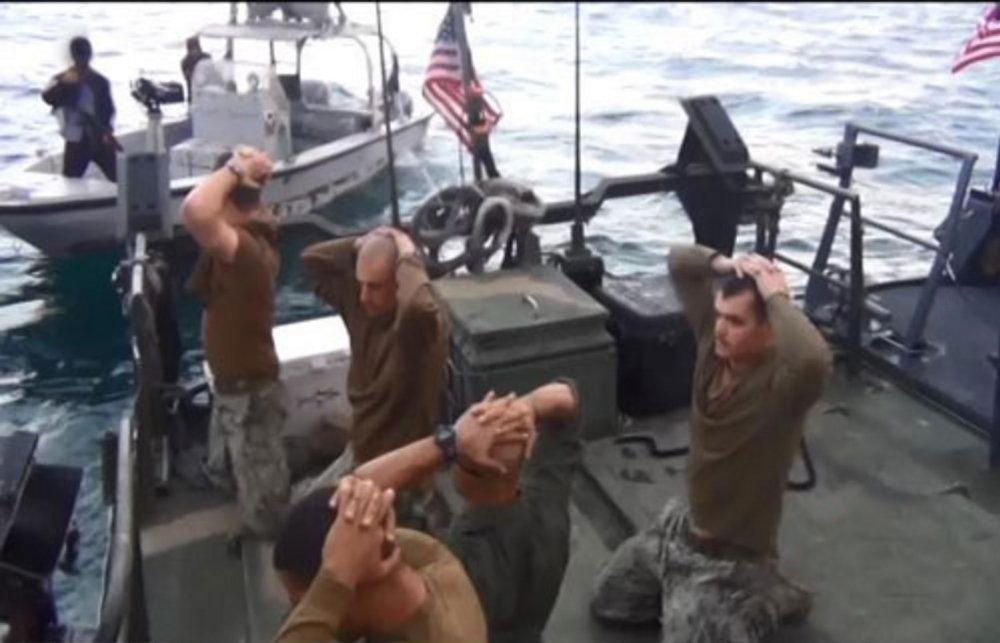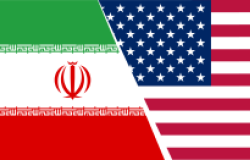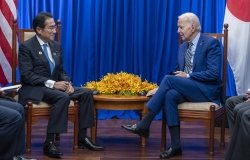Release of U.S. Sailors Is a Win for Rouhani and Iran’s Moderates
The prompt release of the 10 U.S. Navy personnel captured Tuesday by Iran’s military shows that, finally, more sensible counsels are prevailing in Tehran, write Haleh Esfandiari and Robert Litwak.

The prompt release of the 10 U.S. Navy personnel captured Tuesday by Iran’s military shows that, finally, more sensible counsels are prevailing in Tehran. The early description of the Americans as “prisoners” and their mission as “snooping” was quickly abandoned. This is a victory for President Hassan Rouhani, Foreign Minister Mohammad Javad Zarif, and other moderates. It appears that Mr. Rouhani was able to persuade Iran’s supreme leader, Ayatollah Ali Khamenei, of the importance of keeping the agreement over Iran’s nuclear program on track and that on the heels of the fiasco that followed a mob storming the Saudi Arabian embassy in Tehran this month, the Islamic Republic could ill-afford another international uproar.
The rapid defusing of the potential crisis–though hard-liners in Iran could not resist broadcasting photos and videos of the U.S. sailors while they were held–is likely to boost prospects for Mr. Rouhani and his supporters in the February elections for parliament and the Assembly of Experts, the body that will choose the next supreme leader.
The end to this incident contrasts sharply with other recent events, such as Iran’s ballistic-missile test–a violation of a U.N. Security Council resolution–and harassing of a U.S. aircraft carrier in the Strait of Hormuz. Mr. Rouhani and his team are aware that hard-liners in the U.S. Congress responded to those actions by proposing legislation barring President Barack Obama from lifting sanctions on Iranian financial institutions linked to the Islamic Revolutionary Guard Corps. Mr. Obama threatened a veto, saying that the nuclear deal was negotiated “to address one issue only.”
At the outset of talks, U.S. and Iranian negotiators decided to limit their scope to the nuclear dispute. The result was a deal, not a “grand bargain”—transactional, not transformational. Both sides have defended the agreement in discrete transactional terms: Mr. Obama has said that it delayed the threat of an Iranian bomb for 10 to 15 years; Mr. Rouhani has said that Iran defended its “right” to a nuclear program and won sanctions relief for its troubled economy.
For the time being, the deal remains on track. Iran shipped 25,000 pounds of enriched uranium to Russia late last month, and sanctions relief for meeting its obligations under the nuclear deal appeared to be imminent.
The naval incident is a reminder that, whatever both presidents say, tacit linkage between the nuclear agreement and the broader political context is unavoidable. Time will tell whether Mr. Obama’s policy of diplomacy first will remain effective and whether Mr. Rouhani’s preference for diplomacy and outreach will continue to prevail over Iranian hard-liners’ preference for confrontational policies.
The opinions expressed here are solely those of the authors.
This article was originally published in The Wall Street Journal's Think Tank blog.
About the Authors

Middle East Program
The Wilson Center’s Middle East Program serves as a crucial resource for the policymaking community and beyond, providing analyses and research that helps inform US foreign policymaking, stimulates public debate, and expands knowledge about issues in the wider Middle East and North Africa (MENA) region. Read more











